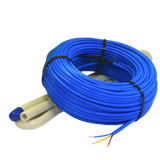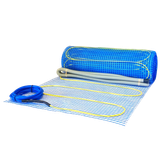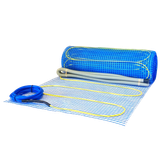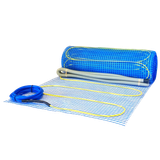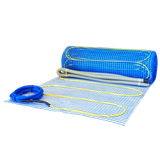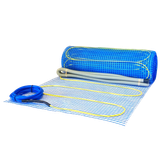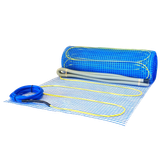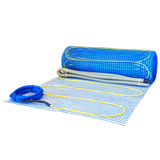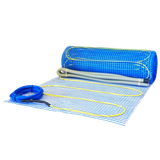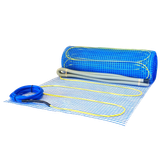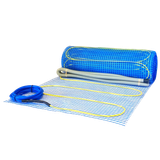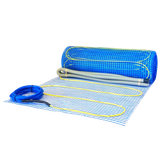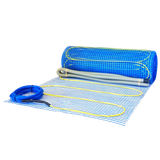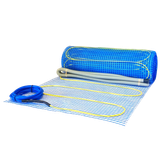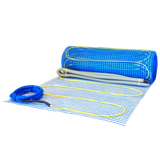THORGEON Heating, Cooling & Ventilation (HVAC)
Heating Cable 45m 900W 4.1A 230V
Heating Cable 32m 640W 2.9A 230V
Heating Cable 98m 1960W 8.9A 230V
Heating Mat 425W 0.5С…5.0m 1.7A 230V
Heating Cable 15m 300W 1.4A 230V
Heating Cable 23m 460W 2.1A 230V
Heating Cable 115m 2300W 10.5A 230V
Heating Cable 57m 1140W 5.2A 230V
Heating Cable 85m 1700W 7.7A 230V
Heating Cable 70m 1400W 6.4A 230V
Heating Mat 255W 0.5С…3.0m 1.0A 230V
Heating Mat 595W 0.5С…7.0m 2.4A 230V
Heating Mat 765W 0.5С…9.0m 3.1A 230V
Heating Cable 10m 200W 0.9A 230V
Heating Cable 160m 3200W 14.5A 230V
Heating Mat 170W 0.5С…2.0m 0.7A 230V
thorgeon ventilator control motor starters and airflow logic
Fans need predictable starts and clean EMC. Soft starters cap inrush to 3–4× In; VFDs with C2/C3 filters and input chokes tame harmonics. Typical ranges cover 0.37–15 kW at 230/400 V AC, IP54/55 motors, and fire-mode bypass where required. Terminals accept 0.5…4 mm² Cu with 0.6–1.2 Nm torque; analogue inputs 0–10 V/4–20 mA drive PI for static-pressure hold. Crews standardise thorgeon ventilator control so the same ramps, filter classes, and shield clamps repeat across plant rooms.
thorgeon pump control pressure, level, and protection
Closed-loop sets use dual PID (pressure and level), sleep/wake to stop heat in low demand, and dry-run detection from power factor change. Cavitation guards watch noise bands; soft-fill avoids water hammer. For booster frames, 2–4 pumps rotate by hours; VFD duty usually sits at 30–60 Hz with check-valve interlocks. Maintenance teams label spares against thorgeon pump control skids by kW, pipe size, and sensor type so swaps don’t disturb tuning.
thorgeon gate operator control torque limits and safety loops
Profiles handle ramp-up, creep-to-endstop, and anti-crush via monitored edges and photocells per EN 12453/12445. Encoder inputs (A/B/Z) keep travel consistent; thermal trips and stall timers protect gearboxes. Typical drives are 230 V single-phase to 1.1 kW or 3-phase for industrial shutters. Installers catalogue thorgeon gate operator control by torque class, leaf mass, and I/O so the same harness and safety chain apply site-wide.
thorgeon hvac automation plant-room coordination
AHU scripts link supply/return fans, dampers, and heater valves with frost protection and filter DP alarms. BACnet/Modbus expose setpoints; DOs interlock smoke control and fire alarm links. Keep 7.5–10 mm breathing around warm drives; publish EMC practice—360° braid clamps at gland plates, SELV/mains segregation—to repeat results with thorgeon hvac automation on every floor.
thorgeon industrial ventilation systems drives, filters, and EMC
Roof fans, scrubbers, and car-park jet units demand higher surge immunity (≥ 4 kV), IP65 field boxes, and stainless fixings. Filter stages add current draw; derate curves consider Δp rise. Where VFD cable lengths exceed 30–50 m, dV/dt filters protect motor insulation. Spec sheets for thorgeon industrial ventilation systems list cable types, screen termination, and max lead lengths so acceptance tests are unambiguous.
thorgeon control accessories for pumps cabinets and field kits
Pressure transducers 0–10 bar, ultrasonic or hydrostatic level sensors, relay manifolds, and fused isolators share one footprint and marker scheme. Bypass contactors meet IEC 60947-4-1; MCB/RCBO curves coordinate upstream. Panel doors carry clear P&IDs with tap-off points. Stocking thorgeon control accessories for pumps by thread, range, and signal type keeps night-shift swap-outs tidy.
thorgeon automation for gates interfaces and commissioning
I/O blocks take monitored edges, safety relays, keypad/reader inputs, and wireless fobs; time channels manage auto-close and holiday logic. Torque learn stores per-gate friction; service counters warn at cycle thresholds. For exposed runs, specify screened cable and surge on all field lines. Commissioning sheets for thorgeon automation for gates record force test results, encoder direction, and stop-to-stop time.
Technical specifications and standards that matter
- Power and environment: 230/400 V AC, −20…+50 °C typical; IP20 in panels, IP54/IP65 field boxes.
- Control I/O: 0–10 V, 4–20 mA, pulse inputs, safe-torque-off on selected VFDs; relay outputs 5–10 A AC-15.
- Coordination: IEC 60204-1 machinery wiring, IEC 61800-5-1 drives, IEC 60947 gear; surge categories and SPD placement documented.
- Wiring: terminals 0.5…4 mm²; strip 8–12 mm; torque 0.6–1.2 Nm; label fonts and colours fixed across panels.
Applications and compatibility
- Offices/hotels: pressure-held supply/return, EC/VFD fans with low acoustic ramps; maintained routes for smoke control.
- Retail/parking: jet fans with high-surge SPDs, stainless hardware, IP65 boxes.
- Water rooms: duty/assist ladder logic, soft-fill, non-return valve monitoring.
- Perimeters/logistics: sliding/roller gates with monitored edges, photocells, and beacon/traffic outputs.
Systems interconnect cleanly with Thorgeon panels, installation boxes, cables, and luminaires—same gland threads, marker sizes, and test tabs.
Selection criteria for B2B buyers
Fix motor kW and duty first, then choose VFD vs soft-starter and filter class. Define sensors (range, output type), safety chain, and comms. Confirm enclosure IP/IK and ambient; publish torque windows, strip lengths, and shield strategy. Room-bundle cabinets and field kits by riser so spares and drawings stay aligned.
Advantages of working with Bankoflamps
Procurement follows your commissioning windows. You get project-specific pricing, near-hour quote turnaround with EAN/MPN, and live EU stock before crews are booked. The portal shows lead times, shipment tracking, and downloadable price lists with validity periods you can plan against. Trusted clients can use post-payment up to 30 days. We consolidate partials so panels, drives, sensors, safety relays, and field boxes arrive room-bundled, and your account manager cross-checks kW ranges, curve/coordination tables, enclosure IP, shield termination, torque notes, and labelling against your drawings—keeping deliveries site-ready across France, the Baltics, Germany, Spain, Italy, Belgium, and the Netherlands.
